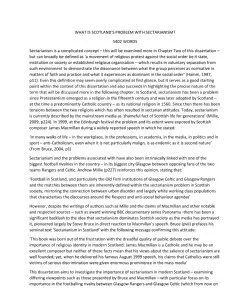WHAT IS SCOTLAND'S PROBLEM WITH SECTARIANISM? Sectarianism is a complicated concept – this will be examined more in Chapter Two of this dissertation – but can broadly be defined as ‘a movem5402 WORDS
WHAT IS SCOTLAND'S PROBLEM WITH SECTARIANISM? Sectarianism is a complicated concept – this will be examined more in Chapter Two of this dissertation – but can broadly be defined as ‘a movem5402 WORDS
WHAT IS SCOTLAND'S PROBLEM WITH SECTARIANISM?
5402 WORDS
Sectarianism is a complicated concept – this will be examined more in Chapter Two of this dissertation – but can broadly be defined as ‘a movement of religious protest against the social order be it state, institution or society or established religious organisation – which results in voluntary separation from such environment to demonstrate the dissonance between what the group perceives as normative in matters of faith and practice and what it experiences as dominant in the social order’ (Hamm, 1987, p11). Even this definition may seem overly complicated at first glance, but it serves as a good starting point within the context of this dissertation and also succeeds in highlighting the precise nature of the term that will be discussed more in the following chapter. In Scotland, sectarianism has been a problem since Protestantism emerged as a religion in the fifteenth century and was later adopted by Scotland – at the time a predominantly Catholic country – as its national religion in 1560. Since then there has been tensions between the two religions which has often resulted in sectarian attitudes. Today, sectarianism is currently described by the mainstream media as ‘shameful fact of Scottish life for generations’ (Millie, 2009, p224). In 1999, at the Edinburgh festival the problem and its extent were exposed by Scottish composer James Macmillan during a widely reported speech in which he stated:
‘In many walks of life – in the workplace, in the professions, in academia, in the media, in politics and in sport – anti-Catholicism, even when it is not particularly malign, is as endemic as it is second nature’ (From Bruce, 2004, p1)
Sectarianism and the problems associated with have also been intrinsically linked with one of the biggest football rivalries in the country – in its biggest city Glasgow between opposing fans of the two teams Rangers and Celtic. Andrew Millie (p227) reinforces this opinion, stating that:
‘Football in Scotland, and particularly the Old Firm institutions of Glasgow Celtic and Glasgow Rangers and the matches between them are inherently defined within the sectarianism problem in Scottish
